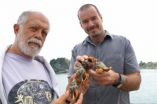(Press-News.org) Boston, MA -- Vasectomy was associated with a small increased risk of prostate cancer, and a stronger risk for advanced or lethal prostate cancer according to a new study from Harvard School of Public Health (HSPH). The researchers found that the association remained even among men who received regular PSA screening, suggesting the increased risk of lethal cancer cannot be explained by diagnostic bias. It is the largest and most comprehensive study to date to look at the link between vasectomy and prostate cancer.
The study appears online July 7, 2014 in Journal of Clinical Oncology.
"This study follows our initial publication on vasectomy and prostate cancer in 1993, with 19 additional years of follow-up and tenfold greater number of cases. The results support the hypothesis that vasectomy is associated with an increased risk of advanced or lethal prostate cancer," said co-author Lorelei Mucci, associate professor of epidemiology at HSPH.
Vasectomy is a common form of contraception in the U.S., with about 15% of men having the procedure. Prostate cancer is the second-leading cause of cancer death among U.S. men, so identifying risk factors for lethal prostate cancer is important for public health.
The researchers analyzed data from 49,405 U.S. men in the Health Professionals Follow-up Study, who were followed for up to 24 years from 1986 to 2010. During that time, 6,023 cases of prostate cancer were diagnosed, including 811 lethal cases. One in four of the men in this study reported having a vasectomy.
The results showed a 10% increased risk of prostate cancer overall in men who had a vasectomy. Vasectomy was not significantly associated with risk of low-grade cancer. However, vasectomy was associated with a stronger risk of advanced and lethal prostate cancer, with an increased risk of 20% and 19% respectively. Among men who received regular PSA screening, the relative increase in risk of lethal prostate cancer was 56%. The effect appeared to be stronger among men who had a vasectomy at a younger age.
Prior work on this topic raised concerns that the positive associations could be linked to bias. However, in the present study, the researchers had access to diverse information and could rule out potential biases, including that men who have vasectomies may seek more medical care in general, that they may have a higher rates of PSA screening, or that the association was due possible confounding by sexually transmitted infections.
In this study, 16 in 1,000 men developed lethal prostate cancer during 24 years of follow-up. Although the relative increase in the risk associated with vasectomy was significant, this translates to a relatively small increase in absolute difference in the risk of lethal prostate cancer, say the researchers. "The decision to opt for a vasectomy as a form of birth control is a highly personal one and a man should discuss the risks and benefits with his physician," said co-author Kathryn Wilson, research associate in the Department of Epidemiology at HSPH.
INFORMATION:
Support for the study was provided by Grants No. P01 CA055075, CA133891, CA141298, and UM1CA167552-01 and by Training Grant No. T32 CA09001 from the National Cancer Institute/National Institutes of Health.
"Vasectomy and risk of aggressive prostate cancer: a 24-year follow-up study," Mohummad Minhaj Siddiqui, Kathryn M. Wilson, Mara M. Epstein, Jennifer R. Rider, Neil E. Martin, Meir J. Stampfer, Edward L. Giovannucci, Lorelei A. Mucci, Journal of Clinincal Oncology, DOI: 10.1200/JCO 2013.54.8446, July 7, 2014
Harvard School of Public Health brings together dedicated experts from many disciplines to educate new generations of global health leaders and produce powerful ideas that improve the lives and health of people everywhere. As a community of leading scientists, educators, and students, we work together to take innovative ideas from the laboratory to people's lives—not only making scientific breakthroughs, but also working to change individual behaviors, public policies, and health care practices. Each year, more than 400 faculty members at HSPH teach 1,000-plus full-time students from around the world and train thousands more through online and executive education courses. Founded in 1913 as the Harvard-MIT School of Health Officers, the School is recognized as America's oldest professional training program in public health.
Vasectomy may increase risk of aggressive prostate cancer
2014-07-09
ELSE PRESS RELEASES FROM THIS DATE:
Bacteria found in bladders of healthy women differ from those in women with incontinence
2014-07-09
Bacteria found in the bladders of healthy women differ from bacteria in women with a common form of incontinence, according to researchers from Loyola University Chicago Stritch School of Medicine.
These findings, published July 9, 2014, in the American Society for Microbiology's online journal mBio, suggest that bacterial communities may play a role in female urinary health.
"Urgency urinary incontinence (UUI) is a common, yet poorly understood, condition with symptoms similar to urinary tract infections," said Alan Wolfe, PhD, co-investigator and professor of Microbiology ...
NASA finds friction from tides could help distant earths survive, and thrive
2014-07-09
As anybody who has started a campfire by rubbing sticks knows, friction generates heat. Now, computer modeling by NASA scientists shows that friction could be the key to survival for some distant Earth-sized planets traveling in dangerous orbits.
The findings are consistent with observations that Earth-sized planets appear to be very common in other star systems. Although heat can be a destructive force for some planets, the right amount of friction, and therefore heat, can be helpful and perhaps create conditions for habitability.
"We found some unexpected good news ...
NASA MESSENGER and STEREO measurements open new window into high-energy processes on the sun
2014-07-09
Understanding the sun from afar isn't easy. How do you figure out what powers solar flares – the intense bursts of radiation coming from the release of magnetic energy associated with sunspots – when you must rely on observing only the light and particles that make their way to near-Earth's orbit?
One answer: you get closer. NASA's MESSENGER spacecraft -- which orbits Mercury, and so is as close as 28 million miles from the sun versus Earth's 93 million miles -- is near enough to the sun to detect solar neutrons that are created in solar flares. The average lifetime for ...
New recreational travel model to help states stop firewood assisted insect travel
2014-07-09
RESEARCH TRIANGLE PARK, NC, July 9, 2014 – The spread of damaging invasive forest pests is only partially powered by the insects' own wings. People moving firewood for camping can hasten and widen the insects' spread and resulting forest destruction. A new U.S. Forest Service study gives state planners a tool for anticipating the most likely route of human-assisted spread they can use to enhance survey and public education efforts.
The study, "Using a Network Model to Assess Risk of Forest Pest Spread via Recreational Travel," was published July 9 in the journal PLOS ...
CNIO scientists discover that pluripotency factor NANOG is also active in adult organisms
2014-07-09
Scientists from the Spanish National Cancer Research Centre (CNIO) have discovered that NANOG, an essential gene for embryonic stem cells, also regulates cell division in stratified epithelia—those that form part of the epidermis of the skin or cover the oesophagus or the vagina—in adult organisms. According to the conclusions of the study, published in the journal Nature Communications, this factor could also play a role in the formation of tumours derived from stratified epithelia of the oesophagus and skin.
The pluripotency factor NANOG is active during just two days ...
No extra mutations in modified stem cells, study finds
2014-07-09
LA JOLLA-The ability to switch out one gene for another in a line of living stem cells has only crossed from science fiction to reality within this decade. As with any new technology, it brings with it both promise--the hope of fixing disease-causing genes in humans, for example--as well as questions and safety concerns. Now, Salk scientists have put one of those concerns to rest: using gene-editing techniques on stem cells doesn't increase the overall occurrence of mutations in the cells. The new results were published July 3 in the journal Cell Stem Cell.
"The ability ...
Hunting gives deer-damaged forests in state parks a shot at recovery
2014-07-09
WEST LAFAYETTE, Ind. - Regulated deer hunts in Indiana state parks have helped restore the health of forests suffering from decades of damage caused by overabundant populations of white-tailed deer, a Purdue study shows.
A research team led by Michael Jenkins, associate professor of forest ecology, found that a 17-year-long Indiana Department of Natural Resources policy of organizing hunts in state parks has successfully spurred the regrowth of native tree seedlings, herbs and wildflowers rendered scarce by browsing deer.
Jenkins said that while hunting may be unpopular ...
Protein pushes breast cancer cells to metastasize
2014-07-09
Using an innovative tool that captures heretofore hidden ways that cells are regulated, scientists at Rockefeller University have identified a protein that makes breast cancer cells more likely to metastasize.
What's more, the protein appears to trigger cancer's spread in part by blocking two other proteins that are normally linked to neurodegeneration, a finding that suggests these two disease processes could have unexpected ties.
The study, which appears in the July 10 issue of Nature, points to the possibility of new cancer therapies that target this "master regulator" ...
Not at home on the range
2014-07-09
As climate change shifts the geographic ranges in which animals can be found, concern mounts over the effect it has on their parasites. Does an increased range for a host mean new territory for its parasites as well?
Not necessarily, says a team of UC Santa Barbara scientists, including parasitologists Ryan Hechinger and Armand Kuris. In a study published in the Journal of Biogeography, Hechinger, Kuris and colleagues show that for some species, the opposite may happen: Hosts may actually lose their parasites when the hosts shift or increase their range. Theirs is one ...
New system would give individuals more control over shared digital data
2014-07-09
Cellphone metadata has been in the news quite a bit lately, but the National Security Agency isn't the only organization that collects information about people's online behavior. Newly downloaded cellphone apps routinely ask to access your location information, your address book, or other apps, and of course, websites like Amazon or Netflix track your browsing history in the interest of making personalized recommendations.
At the same time, a host of recent studies have demonstrated that it's shockingly easy to identify unnamed individuals in supposedly "anonymized" data ...





